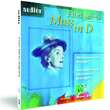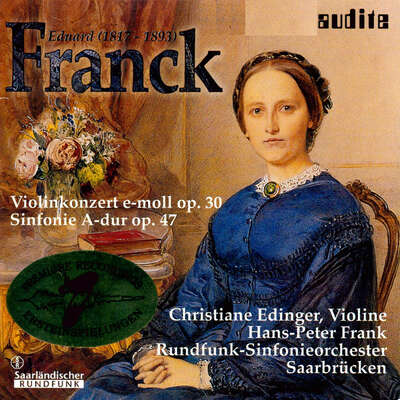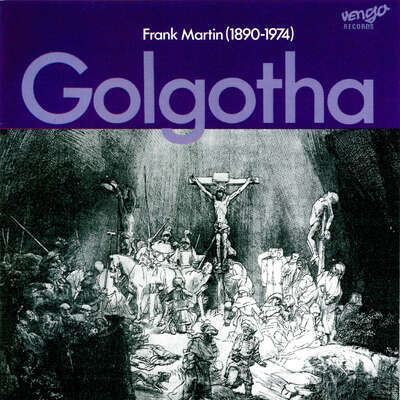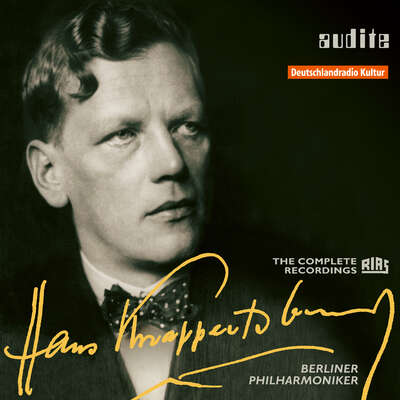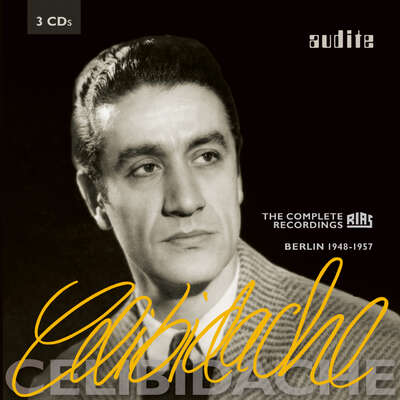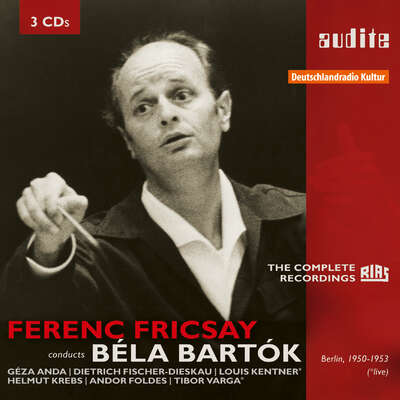
Ethel Smyth was born in 1858 daughter of a British general major. Being a child of the Victorian age she received a strict education at home and at a boarding school against which she revolted again and again. Against her fathers wish she managed to study music in Leipzig -strength of will and...more
"...und zwischen viktorianischem Bombast finden sich unerwartet empfindsame Vokalsoli und kammermusikalisch fein instrumentierte Orchesterstellen." (Klassik heute)
Details
| Ethel Smyth: Mass in D | |
| article number: | 97.448 |
|---|---|
| EAN barcode: | 4009410974488 |
| price group: | BCA |
| release date: | 1. January 1997 |
| total time: | 60 min. |
Informationen
Ethel Smyth was born in 1858 daughter of a British general major. Being a child of the Victorian age she received a strict education at home and at a boarding school against which she revolted again and again. Against her fathers wish she managed to study music in Leipzig -strength of will and persistence were here strongest characteristics.
In Leipzig she is disappointed with the ancient curriculum at the conservatoire but fascinated by the city, the concerts, the meetings with Brahms, Grieg and Clara Schumann. Heinrich von Herzogenberg gave her private lessons and also Tschaikowsky later on. She composed chamber- and pianomusic, a serenade for orchestra was her first success in England. In 1893 it was surpassed by the premiere of the Mass that remained her only religious work. Then she devoted herself to the opera. The most successful opera "The Wreckers", composed after a sinister Cornish legend was conducted by Bruno Walter, Arthur Nickisch and Sir Thomas Beecham.
"When I was young, engrosses as we all were in the story of the Oxford Movement, I had been very High Church, and later when belief passed, this aspect of Anglicanism had never lost its grip on my imagination ... In order to round off the story of this phase of intense belief – belief in the strictest sense of the word – I ought to say that during this and the ensuing year I was composing a Mass ... Into that work I tried to put all there was in my heart but no sooner was it finished than, strange to say, orthodox belief fell away from me, never to return ... Who shall fathom the Divine Plan? Only this will I say, that at no period of my life have I had the feeling of being saner, wiser, nearer truth. Never has this phase, as compared to others that were to succeed it, seemed overwrought, unnatural, or hysterical; it was simply a religious experience that in my case could not be an abiding one."
In the summer of 1891 she searched all over England for a conductor who was daring enough to conduct the big choir composition of a quite unknown composer. She had the feeling as if she was standing up against a wall. The highly respected composers of that time and guardians of tradition, Perry, Standford and Sullivan, whom she knew personally, did not make any allowances to help her.
She found support in a totally "unmusical" source: the French empress Eugenie, widow of Napoleon III, living in exile in England. She supported Ethel Smyth by financing the publication of the Mass at the Novello Press and by giving her the chance to introduce herself to Queen Victoria including the possibility to present a part of the Mass before her court.
She was seated in front of a gigantic grand piano and performed the "Benedictus" and Sanctus as "... in the manner of composer that meant singing the chorus as well as the solo parts, and trumpeting forth orchestral effects as best you can, a noisy proceeding ... emboldened by the sonority of the place, I did the "Gloria" the most tempestuous and ... best number of all. At a certain drum effect a foot came into play, and I fancy that as regards volume of sound at least, the presence of a real chorus and orchestra was scarcely missed."
One and a half year later, in January 1893 the premiere was held with about 1,000 performers in the enormous Royal Albert Hall in front of an audience of 12,000 people. It was received with enthusiasm. The "Gloria" was also performed as festive finale at the end of the Mass being the composer's utmost wish. Fuller-Maitland, a critic at Times wrote:
"This work definitely places the composer among the most eminent composers of her time, and easily at the head of all those of her own sex. The most striking thing about it is the entire absence of the qualities that are usually associated with feminine productions; throughout it is virile, masterly in construction and workmanship, and particularly remarkable for the excellence and rich colour of the orchestration"
In spite of this the work vanished from sight to reappear again 30 years later.
"In the middle twenties, I bethought me, I forget in what connection, of the Mass, which had never achieved a second performance, which none but greybeards had heard, and the existence of which I had practically forgotten. A couple of limp and dusty piano scores were found on an upper shelf, and after agitated further searchings the full score turned up in my loft. In spite of the judgement of the Faculty the work had evidently been appreciated by the mice, and on sitting down to examine it I shared their opinion, and decided that it really deserved a better fate than thirty-one years of suspended animation. But when I consulted the publishers as to the possibility of a revival, the reply was, 'Much as we regret to say so, we fear your Mass is dead'.
This verdict stung me into activity, and to cut a long story short, in 1924 Adrian Boult produced it brilliantly in Birmingham and the following week in London. This time the press was excellent."
Writing to a friend about the performance Ethel Smyth noted critically:
"On the whole satisfactory, but you know how hard I am to please ... Audience warm (for stodgy Birmingham). Chorus fine. Boult first rate. Orchestra putrid ... All the trombones were played by policeman."
The greatest pleasure Ethel Smyth had was in a letter from George Bernhard Shaw, who had been to the premiere of the Mass 30 years earlier and had a very detailed witty and altogether positive critic which had been published in "The World".
"Dear Dame Ethel, – Thank you for bullying me into going to hear that Mass.
The originality and beauty of the voice parts are as striking today as they were 30 years ago, and the rest will stand up in the biggest company. Magnificent!
You are totally and diametrically wrong in imagining that you have suffered from a prejudice against feminine music. On the contrary you have been almost extinguished by the dread of masculine music. It was your music that cured me for ever of the old delusion that women could not do men's work in art and other things. (That was years ago, when I knew nothing about you, and heard an overture – "The Wreckers" or something – in which you kicked a big orchestra all round the platform.) But for you I might not have been able to tackle St Joan, who has floored every previous way playwright. Your music is more masculine than Handel's.
Your dear big brother, G. Bernard Shaw."
For this re-performance in 1924 she revised the composition. The changes refer to a small improvement in the choir- and orchestralparts and a reduction of the metronome beat most considerably in the fast movements. The changes are surely due to the remembrance of the premiere with its gigantic number of performers. Here our recording again approaches the original intention of the composer.
Helmut Wolf
Reviews
Diapason | 6/2004 | Benoît Fauchet | June 1, 2004
La Messe en ré ne connut pas la carrière que semblait lui promettre sa création en grande pompe, par un millier d’exécutants réunis au RoyalMehr lesen
American Record Guide | 6/2003 | Koob | November 1, 2003
Victorian England produced no more colorful and controversial woman than Ethel Smyth (1858 – 1944). Not only was she a wonderful composer, but aMehr lesen
Not one to suffer fools gladly, she could hold her own with the most chauvinistic men of her era. Even such a remarkable character (and critic) as George Bernard Shaw held her and her music in high esteem, treating her like “one of the boys” in their correspondence. To his own credit, he credited her with “curing me forever of the old delusion that women could not do men’s work in art or other things”. He went so far as to thank her, in the same letter, for “bullying” him into going to hear this wondrous mass, and asserting that her music was “more masculine than Handel’s”.
Indeed, this is forthright and original music of great virility. As I’ve heard only a scattering of her piano and chamber music, the intensity and unbridled spiritual power of this premiere recording came as quite a surprise to me. Dame Ethel is quoted in the excellent notes as having put “all there was in my heart” into it when she wrote it in 1890 – the final fruit of her early conventional faith, stemming from her high-church Anglican upbringing. Then she went to say, “but no sooner was it finished than…orthodox belief fell away from me, never to return”.
The music, scored for the usual soloists with mixed choir and orchestra, sets the usual propers of the Latin mass. The originality of her writing consistently transcends the apparent influences of her romantic-era forbears. She knew how to write effectively for both a large chorus and orchestra and worked her ravishing solo lines into the musical fabric most beautifully.
The urgent, driven Kyrie is leavened by moments of melting lyricism. Although the Gloria came next in the original score, it is here saved (in accordance with the composer’s wishes) until the work’s end, as it was in the two performances the mass was given in her lifetime. Power and passion predominate in most of the succeeding movements as well, though interludes of limpid, melodious serenity supply both contrasts and occasional relief. Only the Benedictus remains consistently low-key and lovely. The mighty Gloria brings this magnificent work to a jubilant, olympic close that would have done Beethoven proud. It left me feeling drained but exalted.
Performances are committed and memorable, with soloists, chorus, and orchestra giving their all in the service of such extraordinary music – probably Smyth’s masterpiece. Sound quality is very good, but texts are lacking.
Shame on the Brits for allowing this blockbuster to languish in obscurity for so long, and – for all their rich choral tradition and accomplishment – suffering German musicians to finally rescue what deserves to be an English national treasure. Take the time to research this amazing lady on-line – you’ll be glad you did. I can imagine Smyth’s irrepressibly self-confident spirit looking down on this effort with a smug, “I TOLD you it was good” sort of air. You have simply GOT to hear it!
CD Compact | Num 164, Abril 2003 | Maribel Carracedo | April 1, 2003
Hija de un general británico, la compositora Ethel Smyth (1858-1944) no loMehr lesen
http://mugi.hfmt-hamburg.de/Smyth | März 2002 | Melanie Unseld | March 1, 2002
Mit großem Enthusiasmus wird auf dieser Aufnahme Ethel Smyths Messe musiziert. Helmut Wolf hält ein stimmiges Solistenquartett (CatrionaMehr lesen
Das Orchester | 07-08/1998 | Herbert Lölkes | July 1, 1998
"Die Originalität und die Schönheit der Solopartien sind heute noch soMehr lesen
News
"Die Originalität und die Schönheit der Solopartien sind heute noch so...
Mit großem Enthusiasmus wird auf dieser Aufnahme Ethel Smyths Messe musiziert....
Hija de un general británico, la compositora Ethel Smyth (1858-1944) no lo tuvo...
Victorian England produced no more colorful and controversial woman than Ethel...
La Messe en ré ne connut pas la carrière que semblait lui promettre sa...
